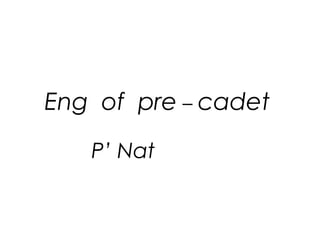Eng of pre тАУ cadet
- 1. Eng of pre тАУ cadet PтАЩ Nat
- 2. Patterns of speech тАвSyllable + syllable = word тАвWord + word = phrase тАвPhrase + phase = clause тАвClause + clause = sentence тАвSentence + sentence = passage
- 3. Word / speech /part of speech тАвNoun тАвPronoun тАвVerb тАвAdjective тАвAdverb тАвConjunction тАвPreposition
- 4. тАвNoun = р╕Др╕│р╕│р╕Чр╕╡р╣Ир╣Гр╕Кр╣Йр╣Ар╕Ыр╣Зр╕Щр╕Кр╕╖р╣Ир╕нр╣Ар╕гр╕╡р╕вр╕Бр╕кр╕┤р╣Ир╕З р╕Хр╣Ир╕│р╕Зр╣Ж тАУ Subject = Mary gave John help - Predicate = His sister is Mary - Indirect object = Mary told John the story
- 5. - Direct object = Mary gave help to John - Predicate of object = We elected Kennedy president - Object of a preposition = I spoke to John
- 6. -Vocative = Come quickly, Mary - Appositive = My eldest sister, Mary, left yesterday.
- 7. Nouns тАУ classified by meaning тАв Proper noun George, Thanu, Monday , January тАв Common noun тАв concrete = girl, house, car, painter collective = class, group, committee Ex. A flock of sheep, A band of singers a battalion of soldiers
- 8. Nouns - classified by form тАв Compound noun - N + N = skyrocket, river blank - N + Gerund = coal тАУ mining, bird тАУ watching - Gerund + N = dining room, swimming pool - Adj. + N = blue blood, black coffee
- 9. - V + N = pickpocket, plowman - Prep. + N = downpour, upstairs - V + Prep. = makeup, use up - N + prep. = son тАУ in тАУlaw, mother тАУ in тАУlaw, brothers тАУ in тАУ arms
- 10. Nouns - classified by function тАвCountable N. Common noun Collective noun Uncount N. Only singular тАв Names of substances Bread gold paper sand water ice oil stone coffee wood soap wine beer dust tea cream jam gin
- 11. тАв Abstract nouns - advice, beauty, fear,death, hope information, knowledge, experience, work, courage, тАв Branches of subjects history, chemistry, sociology, dentistry physics, biology, algebra, geography, mathematics, economics
- 12. Uncount Singular Plural Noun Toast Bread Ink Sand Water Wine Tea Oil a piece of toast a loaf of bread a bottle of ink a bag of sand a bottle of water a glass of wine a cup of tea a barrel of oil pieces of toast loaves of bread bottles of ink bags of sand bottles of water glasses of wine cups of tea barrels of oil
- 13. Changing forms of nouns тАв Number - Singular яГа Plural . Gender - Masculine яГа Feminine . Possessive - Adding - тАШs - of
- 14. 1. Number Add S = bed тАУ beds, chair тАУ chairs s, sh, x, ss, ch, z, + es = bush-bushes y -> i + es = army тАУ armies, city тАУ cities (a,e,i,o,u) тАУ y + s = boy тАУ boys (alphabet- o +s) = hero тАУ heroes , f, fe тАУ> v + es = knife тАУ knives Change = foot тАУ feet, child тАУ children
- 15. тАвр╕Щр╕▓р╕бр╕Ър╕▓р╕Зр╕гр╕╣р╕Ыр╣Ар╕Ыр╣Зр╕Щр╕Юр╕лр╕╣р╕Юр╕Ир╕Щр╣М р╣Гр╕Кр╣Йр╕нр╕вр╣Ир╕▓р╕З р╣Ар╕нр╕Бр╕Юр╕Ир╕Щр╣М р╣Ар╕Кр╣Ир╕Щ news тАвр╕Щр╕▓р╕бр╕бр╕╡р╕гр╕╣р╕Ыр╣Ар╕Фр╕╡р╕вр╕зр╣Ар╕Ыр╣Зр╕Щр╣Др╕Фр╣Йр╕Чр╕▒р╣Йр╕Зр╣Ар╕нр╕Бр╕Юр╕Ир╕Щр╣Мр╣Бр╕ер╕░ р╕Юр╕лр╕╣р╕Юр╕Ир╕Щр╣М р╣Ар╕Кр╣Ир╕Щ deer sheep, fish, series тАвр╕Щр╕▓р╕бр╕Чр╕╡р╣Ир╕Хр╣Йр╕нр╕Зр╣Гр╕Кр╣Йр╣Ар╕Ыр╣Зр╕Щр╕Юр╕лр╕╣р╕Юр╕Ир╕Щр╣Мр╣Ар╕кр╕бр╕н р╣Ар╕Кр╣Ир╕Щ trousers, goods, shorts, scissors, eye тАУ glasses, pants тАвр╕гр╕╣р╕Ыр╣Ар╕нр╕Бр╕Юр╕Ир╕Щр╣М р╣Бр╕Хр╣Ир╕Др╕зр╕▓р╕бр╕лр╕бр╕▓р╕вр╕Юр╕лр╕╣р╕Юр╕Ир╕Щр╣М р╣Ар╕Кр╣Ир╕Щ people , poultry, cattle, vermin
- 16. 2. Gender - masculine = boy , bull, cock, king - feminine = girl, cow, hen, mother - neuter = fire, air , water, iron - common = bird, child, fish 3. Possessive boy тАУ boyтАЩs, man тАУ manтАЩs, men тАУ menтАЩs women тАУ womenтАЩs, lady - ladies тАУ ladies тАШ
- 17. Using of + N. - р╣Ар╕бр╕╖р╣Ир╕нр╕Ьр╕╣р╣Йр╣Ар╕Ыр╣Зр╕Щр╣Ар╕Ир╣Йр╕▓р╕Вр╕нр╕Зр╕Чр╕│р╕▓р╕лр╕Щр╣Йр╕▓р╕Чр╕╡р╣Ир╕Щр╕▓р╕б р╣Бр╕ер╣Йр╕зр╕Хр╕▓р╕бр╕Фр╣Йр╕зр╕в р╕зр╕ер╕╡ р╕лр╕гр╕╖р╕нр╕нр╕Щр╕╕р╕Ыр╕гр╕░р╣Вр╕вр╕Д The boy ran about, obeying the directions of a man with a whistle. I took the advice of a couple I met on the train and hired a car. - р╣Ар╕бр╕╖р╣Ир╕нр╣Гр╕Кр╣Йр╕Бр╕▒р╕Ър╣Ар╕Ир╣Йр╕▓р╕Вр╕нр╕Зр╕Чр╕╡р╣Ир╣Др╕бр╣Ир╕бр╕╡р╕Кр╕╡р╕зр╕┤р╕Х The walls of the town = the town walls the roof of the church = the church
- 18. р╕Бр╕▓р╕гр╕кр╕гр╣Йр╕▓р╕Зр╕Др╕│р╕▓р╕Щр╕▓р╕б тАв ity = similarity, density тАв ness = calmness, oneness тАв - er, - ar, - or


















